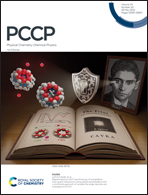Electronic polarization effects on membrane translocation of anti-cancer drugs†
Abstract
Free-energy calculations are crucial for investigating biomolecular interactions. However, in theoretical studies, the neglect of electronic polarization can reduce predictive capabilities, specifically for free-energy calculations. To effectively mimick polarization, we explore a Charge Switching (CS) model, aiming to narrow the gap between computational and experimental results. The model requires quantum-level partial charge calculations of the molecule in different environments, combined with atomistic MD simulations. Studying three different anti-cancer drug molecules with three different phospholipid membranes, we show that the method significantly improves agreement with available experimental data. In contrast, using conventional fixed charge atomistic methods, qualitative discrepancies with experiments are observed, and we show that neglecting polarization may lead to an unphysical free energy sign inversion. While the CS method is here applied to anti-cancer drug-membrane translocation, it could be used more generally to study processes considering solvent effects.



 Please wait while we load your content...
Please wait while we load your content...